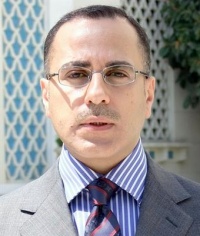National laws criminalising freedom of expression
According to article 25 of the Criminal Code, criticising the Emir is an offence to the Constitution, and is punishable by up to five years imprisonment. On 5 April 2015, an appeal court sentenced a Kuwaiti online journalist, Ayyad Al-Harbi to two-year imprisonment for a tweet that was considered "insulting" to the Emir. On 18 May 2015, the Kuwaiti Court of Cassation sentenced former Member of Parliament, Mussalam Al Barrack, to two years imprisonment on charges of "insult to the Emir," an accusation that has become a regular pretext to convict any person who criticises the government's policy.
Further, laws on state security provide for instance a sentence of three years imprisonment for "intentionally broadcasting news, statements, or false or malicious rumours [...] that harm the national interest of the State," as stated in article 15 of Kuwait's new Communication Law (No. 37/2014), which established a Commission for Mass Communications and Information Technology, mandated with supervising technical issues, but also with controlling the content of the information. The Commission can grant or refuse licenses without giving any reason and without the possibility to appeal the decision.
The most prominent example for curbing the freedom of expression and freedom of the press is the closure of Dar Al Watan Newspaper and Al Watan TV Channel earlier this year. An administrative decision issued by the authorities revoked the publishing and broadcasting license of both entities in early January 2015 and was upheld even though it was rendered invalid by judicial decision in two instances.
"It is alarming to witness the government overriding its own judiciary and silencing a moderate and independent news outlet," commented Julia Legner Case Officer for the Gulf and the Mashreq. "The recent adoption of more repressive legislation does not hint at a genuine commitment of the Kuwaiti authorities to respect the civil and political rights of its citizens, above all the right to freedom of expression."
Increasing repression of peaceful demonstrations
Also worrying is the intensification of the repression against peaceful demonstrations. Between 2 and 7 July 2014, the Kuwaiti police forces made an excessive use of force against peaceful demonstrators asking for the release of Musallam al Barrak. Despite the several international treaties consecrating this right – including the International Covenant on Civil and Political Rights (ICCPR), binding on Kuwait by virtue of its accession in May 1996 – the Ministry of Interior stated on 4 July that the Police would "continue to prevent and tackle with all force such practice," that is "any form of rioting, violence and incitement."
Systematic discrimination against the Biduns
Alkarama regrets that Kuwait has rejected the recommendations made with regard to the protection of the roughly 120,000 stateless people living within its territory. Although they've been present in the country for over a century, the Biduns continue to be subjected to systematic violations of their most fundamental political, economic and social rights. Their access to education health care and the labour market is very limited.
Opposing the multiple discriminations that they are subjected to, the Bidun have staged numerous demonstrations in the last three years, many of which were violently crashed by the Kuwait Security Forces. Several hundreds of peaceful protestors have been arrested such as Bidun activist Abdulhakim Al Fadhli, who remain imprisoned until today.
Alkarama encourages the recommendations made by Australia, Canada and Germany to show credible commitment to improving the status of the Bidun by ratifying the UN Convention relating to the Status of Statelessness Persons and the Convention on the Reduction of Statelessness.
Revocation of nationality
While Alkarama welcomes Kuwait's acceptance of a recommendation to stop revoking citizenships, it remains to be seen whether and how thoroughly the Kuwaiti authorities will be following up on their promises and what concrete measures will be taken.
In 2014, 33 people saw their nationality revoked as a method of repression, notably against political activists and human rights activists. Article 13 of the 1959 Law on Nationality provides, in fact, for the withdrawal of nationality by decree of the Interior Ministry for any person who "has promoted principles that will undermine the social or economic system of the country, belongs to a foreign political party" or "threatens the higher interests of the State or its security." Additionally, decisions to revoke nationality cannot be appealed legally or administratively because there is no competent body to assess questions of nationality.
On 21 July 2014, a Parliamentary Decree (No. 185/2014) ordered the revocation of nationality of five people, including the owner of the daily Alam Al-Youm, Ahmad Jabr Al-Shammari. His four children were thus also left without nationality. The next day, the two pro-opposition media companies were closed by the authorities since, under the Law on Press and Audio-Visual Media, the owner of media channels must be of Kuwaiti nationality.
Core recommendations
While it is a positive indication that Kuwait is implementing the recommendations on the establishment of a National Human Rights Institution (NHRI), many concerns remain.
Alkarama strongly encourages the Kuwaiti authorities to consider the following core recommendations:
- Amend laws that criminalise any form of criticism of the ruling elite or State authorities, notably the "insult to the Emir";
- Grant Kuwaiti nationality to the Biduns and put an end to the discrimination against them
- End the practice of revoking nationality as a method of reprisal against political opponents
For more information or an interview, please contact the media team at This email address is being protected from spambots. You need JavaScript enabled to view it. (Dir: +41 22 734 1008)
 Algeria
Algeria Bahrain
Bahrain Djibouti
Djibouti Egypt
Egypt Iraq
Iraq Palestine/Israel
Palestine/Israel Jordan
Jordan Kuwait
Kuwait Lebanon
Lebanon Libya
Libya Mauritania
Mauritania Morocco
Morocco Oman
Oman Qatar
Qatar Saudi Arabia
Saudi Arabia Sudan
Sudan Syria
Syria Tunisia
Tunisia United Arab Emirates
United Arab Emirates Yemen
Yemen Other Countries
Other Countries





